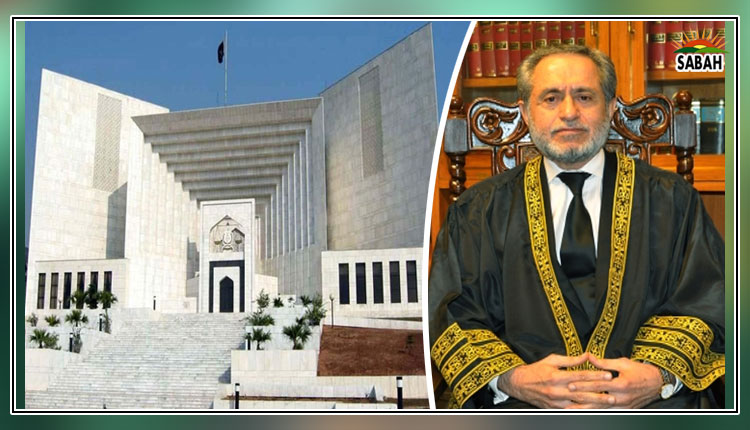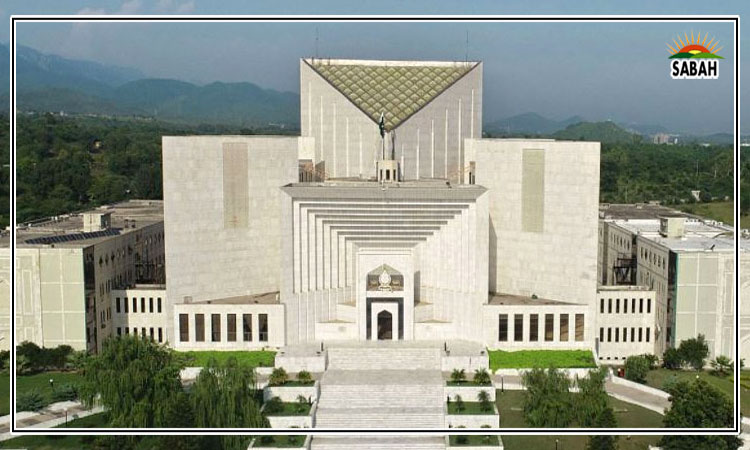Bias and recusal…Abubakar Riaz | Arslan Mahmood Goraya
JUDICIAL recusal has become the talk of the town in the context of high-profile Supreme Court cases. Otherwise seen as safeguarding judicial independence, recusal has become a political tool to witch-hunt the judiciary. Used with reckless abandon, the term bias is losing its importance among legal circles. Political parties often demand the recusal of a particular judge, alleging partisanship. The pressure on the judges to recuse themselves, however, is not limited to the apex court. The entire justice system finds itself grappling with it.
Serving judges in Pakistan are obligated to follow to the letter the Oaths of Office contained in the Third Schedule of the Constitution, binding them to perform their duties impartially and not allowing personal interest to influence their official conduct and decisions.
According to jurisprudence on the subject, across jurisdictions, there are three instances where judicial recusal becomes necessary for fair trial and due process. The first involves cases relating to near relatives or close friends. Intriguingly, this is the only ground which finds support in Pakistans judicial system. This basis for judicial recusal was laid down in a historic case titled Federation of Pakistan vs Muhammad Akram Sheikh. Article 4 of The Code of Conduct for Judges of the Supreme Court and the High Courts of Pakistan also makes it mandatory for a judge to recuse himself in a case involving near relatives or close friends.
The second ground for recusal involves the pecuniary interest of the judge as a famous legal maxim of natural justice states that no man shall be a judge in his own cause. The leading case on it is Tumey vs State of Ohiofrom the US jurisdiction wherein the court invalidated the Ohio statute as it financially incentivised the judge to convict the accused. The court relied on the common law rule that a judge must not have a direct, personal, and substantial pecuniary interest in the case as his interest would corrupt his integrity.
Jurisprudence on judicial recusal must evolve in Pakistan.
The third basis of judicial recusal involves cases of criminal contempt. A major case clarifying this ground is Mayberry vs Pennsylvania wherein the US supreme court held that when the defendant faces charges of criminal contempt, he should be given a public trial before a judge other than the one reviled by the contemnor. The court explained that a vilified judge so cruelly slandered is unlikely to maintain that calm detachment necessary for fair adjudication.
Although cases involving recusal are entertained by Pakistani courts now and then, there is a lack of settled jurisprudence on the matter. Unfortunately, the countrys jurisprudence does not deal with the issue of recusal with greater nuance and sensitivity, resulting in inconsistency in determining the test for recusal. Analysing cases of recusal presents us with three major categories that define a general trend: (i) the discretion of individual judges to decide whether or not to recuse themselves; (ii) real likelihood or real danger of bias as standard proof for recusal; (iii) proving actual bias as a necessary condition for recusal. Generally speaking, Pakistani courts have asked for proof of actual bias. However, in the absence of substantive proof, the courts have left it to the discretion of the impugned judge(s) and favoured their subjective opinion vis–vis recusal.
The jurisprudence on bias and recusal is comparatively underdeveloped in Pakistan. Without reforming various aspects of recusal law, public confidence in the judiciary, which is the primary source of judicial legitimacy, will continue to wane.
In order to attain a level at which bias appears to be alien to justice and the judicial system, it is necessary to explore the manner in which recusal law has been formulated in various jurisdictions around the world. Perhaps inspiration can be taken from the US and Australia where established rules of procedure govern the subject. It is high time that Pakistani courts formulated an elaborate code, containing exhaustive illustrations of instances in which bias can manifest itself and whether recusal must be a necessary remedy for bias in the said instances. By adopting an objective standard, the issue of frivolous objections, aimed at the forum-shopping of judges, can be checked.
Therefore, we need to formulate a specific procedural law on recusal, at the heart of which must lie an instruction: judges cannot transform the last resort of recusal into a soft option that allows them to evade their duty but at the same time they must recuse themselves if their presence on the bench affects the impartiality of proceedings. After all, justice must not only be done, it must also be seen to be done.
The writers are Lahore-based lawyers. They are the alumni of the Shaikh Ahmad Hassan School of Law, Lums.
Courtesy Dawn, May 8th, 2023












